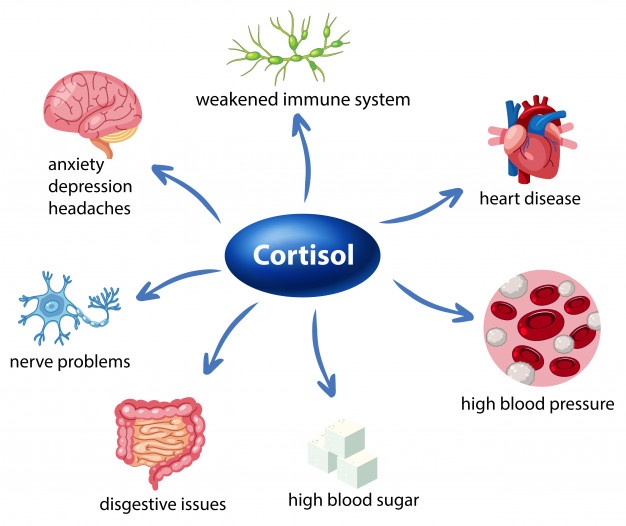Hormonal imbalances can significantly influence weight gain and overall health. In today’s fast-paced world, managing hormones such as insulin, cortisol, leptin, and thyroid hormones is crucial for anyone struggling with weight issues. This comprehensive guide provides actionable tips and expert-backed strategies to help you get your weight gain hormones under control. With insights drawn from reputable sources like Healthline and Mayo Clinic, we dive into the roles these hormones play in your body and reveal effective lifestyle adjustments to enhance your metabolism, improve energy levels, and optimize weight loss.
In this article, we cover:
- How To Exercise For Weight Loss: Tailoring exercise routines to promote hormonal balance and efficient fat loss.
- Insulin: Understanding its role in weight gain and strategies to improve insulin sensitivity.
- Cortisol: Managing stress and its effects on your body’s fat storage.
- Leptin: Balancing appetite and satiety signals to prevent overeating.
- Thyroid Hormones: Boosts metabolism and ensures optimal thyroid function.
Reason Why I’m Gaining Weight
Understanding Insulin and Its Impact on Weight Gain

Insulin is a crucial hormone produced by the pancreas that regulates blood sugar levels and energy storage. When insulin levels are chronically high—a condition known as hyperinsulinemia—it can lead to insulin resistance, which is closely linked to weight gain and metabolic disorders.
How Insulin Affects Your Body
- Blood Sugar Regulation: Insulin helps transport glucose from your bloodstream into cells, where it is used for energy. However, when cells become resistant to insulin, glucose builds up, leading to higher blood sugar levels and an increased risk of type 2 diabetes.
- Fat Storage: Excess insulin promotes the storage of fat, especially around the abdomen. This hormone signals the body to store energy, making weight loss more challenging.
- Appetite Control: Insulin can also affect your appetite. Elevated insulin levels may lead to increased hunger and cravings, particularly for carbohydrates and sugary foods.
Strategies to Improve Insulin Sensitivity
- Adopt a Balanced Diet: Focus on whole foods such as lean proteins, vegetables, whole grains, and healthy fats. Reducing refined carbohydrates and sugars can help stabilize insulin levels. For more information on a balanced diet, check out Harvard T.H. Chan School of Public Health.
- Incorporate Intermittent Fasting: Some studies suggest that intermittent fasting can improve insulin sensitivity by allowing the body to use stored energy more effectively.
- Regular Exercise: Physical activity, especially resistance training and aerobic exercises, can significantly improve your body’s response to insulin.
- Manage Stress: Chronic stress increases cortisol production, which can further impair insulin sensitivity.
By optimizing your diet and incorporating regular physical activity, you can help balance insulin levels and pave the way for more effective weight management.
Managing Cortisol: The Stress Hormone and Its Role in Weight Gain

Cortisol, commonly known as the stress hormone, is released by the adrenal glands in response to stress. While it plays a vital role in your body’s fight-or-flight response, persistently high cortisol levels can lead to several adverse effects, including increased fat storage and weight gain.
How Cortisol Contributes to Weight Gain
- Fat Accumulation: High cortisol levels can increase the storage of fat, particularly in the abdominal area. This is not only aesthetically concerning but also a risk factor for various health issues.
- Increased Appetite: Cortisol is linked to cravings for high-calorie, sugary, and fatty foods, making it easier to overeat during stressful periods.
- Sleep Disruption: Elevated cortisol can interfere with your sleep patterns, which in turn affects your metabolism and hormone balance. Poor sleep is closely linked to weight gain and reduced energy levels.
Effective Ways to Reduce Cortisol Levels
- Stress Management Techniques: Practices such as meditation, yoga, deep breathing exercises, and mindfulness can help lower cortisol levels. For more insights on stress reduction, explore Mayo Clinic’s stress management tips.
- Regular Physical Activity: Moderate exercise, such as walking, swimming, or cycling, not only helps manage stress but also improves overall hormonal balance. Avoid excessive exercise, as overtraining can actually raise cortisol levels.
- Adequate Sleep: Aim for 7-9 hours of quality sleep per night. Creating a consistent sleep schedule and a relaxing bedtime routine can help reduce stress and balance cortisol production.
- Balanced Nutrition: A diet rich in fruits, vegetables, lean proteins, and healthy fats can support adrenal health. Avoiding excessive caffeine and sugar can also help stabilize cortisol levels.
By integrating stress-reduction techniques and maintaining a healthy lifestyle, you can significantly reduce cortisol levels and mitigate their impact on weight gain.
Leptin: The Key to Appetite Regulation and Weight Management
Leptin, often referred to as the “satiety hormone,” is produced by fat cells and plays a critical role in regulating hunger and energy balance. It signals your brain to reduce appetite when you have enough stored energy. However, leptin resistance—a condition where the brain does not respond effectively to leptin—can lead to overeating and weight gain.
The Role of Leptin in Your Body
- Appetite Control: Leptin helps regulate your hunger by signaling the brain when you are full. When leptin levels are balanced, you are less likely to overeat.
- Energy Expenditure: Adequate leptin levels promote energy expenditure, helping your body burn calories more efficiently.
- Leptin Resistance: When leptin resistance occurs, the brain fails to recognize the satiety signals, leading to increased food intake and reduced energy expenditure. This condition is commonly linked to obesity and metabolic syndrome.
Tips to Improve Leptin Sensitivity
- Maintain a Healthy Diet: Eating whole, unprocessed foods can help maintain balanced leptin levels. Focus on high-fiber foods, lean proteins, and healthy fats.
- Regular Exercise: Both aerobic and strength-training exercises can improve leptin sensitivity, aiding in better appetite regulation.
- Prioritize Sleep: Just as with cortisol, sleep plays a vital role in leptin production. Ensuring you get enough restorative sleep each night is essential for maintaining proper leptin function.
- Reduce Inflammation: Chronic inflammation can impair leptin signaling. Incorporate anti-inflammatory foods like berries, leafy greens, and omega-3 rich fish into your diet.
For further reading on leptin and its impact on weight, Healthline’s guide on leptin resistance offers valuable insights.
Thyroid Hormones and Their Influence on Metabolism
The thyroid gland produces hormones that are fundamental to regulating metabolism, energy levels, and overall body function. An imbalance in thyroid hormones, whether due to hypothyroidism or hyperthyroidism, can significantly affect weight and energy levels.
The Importance of Thyroid Hormones
- Metabolic Rate Regulation: Thyroid hormones control the speed at which your body uses energy. Low levels of thyroid hormones (hypothyroidism) can slow down metabolism, leading to weight gain, while high levels (hyperthyroidism) can accelerate metabolism, often resulting in weight loss.
- Energy and Mood: Thyroid imbalances can affect energy levels, mood, and overall well-being. Symptoms of hypothyroidism include fatigue, depression, and a sluggish metabolism.
- Long-Term Health: Chronic thyroid issues can lead to other health complications, including heart problems and impaired cognitive function.
How to Support Thyroid Health
- Nutrient-Rich Diet: Ensure your diet includes essential nutrients for thyroid health, such as iodine, selenium, and zinc. Foods like seaweed, Brazil nuts, and lean proteins are excellent choices.
- Regular Medical Check-Ups: If you suspect thyroid imbalance, consult with a healthcare professional. Regular blood tests can help monitor thyroid function and ensure proper treatment.
- Manage Stress: As stress can adversely affect thyroid function, integrating stress-reducing practices into your routine is vital.
- Exercise and Sleep: Regular physical activity and sufficient sleep are essential for supporting thyroid health and overall metabolic function.
For additional details on maintaining thyroid health, refer to Mayo Clinic’s thyroid health resources.
How to Exercise for Weight Loss: Optimizing Your Workouts for Hormonal Balance

Exercise is a powerful tool for managing weight gain hormones and promoting overall health. Tailoring your workout routine can help regulate insulin, lower cortisol, improve leptin sensitivity, and support thyroid function.
Designing an Effective Exercise Routine
Mind-Body Workouts: Activities like yoga and Pilates not only improve flexibility and core strength but also lower stress levels, thereby reducing cortisol and supporting overall hormonal health.
Combination of Cardio and Strength Training: Aerobic exercises, such as running, cycling, or swimming, help burn calories and improve cardiovascular health. Strength training, on the other hand, builds muscle mass, which boosts metabolism and improves insulin sensitivity.
High-Intensity Interval Training (HIIT): HIIT workouts alternate between intense bursts of exercise and short recovery periods. This method not only burns a high number of calories in a short amount of time but also helps regulate hormonal imbalances by reducing insulin resistance and boosting metabolism.
Consistency Over Intensity: While pushing yourself can yield results, it’s crucial to find a balance. Regular moderate exercise is often more beneficial for long-term hormonal balance and weight management than sporadic, intense workouts.
How To Exercise For Weight Loss

© depositphotos
Tips for Incorporating Exercise into Your Daily Routine
- Set Realistic Goals: Whether you’re starting a new exercise regimen or enhancing an existing routine, set achievable goals that promote steady progress. This could include a daily step target, scheduled workout sessions, or a gradual increase in weights.
- Listen to Your Body: Overtraining can lead to elevated cortisol levels and hinder your weight loss efforts. Ensure you include rest days and allow your body to recover.
- Stay Hydrated and Nourished: Proper hydration and nutrition are key to maximizing the benefits of your workouts. A balanced post-workout meal or snack that includes lean protein and complex carbohydrates can support muscle recovery and hormonal balance.
- Track Your Progress: Keeping a fitness journal or using apps to track your workouts can help you stay motivated and make necessary adjustments to your routine over time.
For more detailed exercise routines and fitness tips, visit Bodybuilding.com or ACE Fitness.
Conclusion
Getting your weight gain hormones under control is essential for effective weight management and overall well-being. By understanding how insulin, cortisol, leptin, and thyroid hormones influence your metabolism, you can implement targeted lifestyle changes that promote hormonal balance and aid in weight loss. From adopting a nutrient-rich diet and managing stress to incorporating a balanced exercise regimen, every small step can contribute to a healthier, more vibrant you.
Remember, hormonal balance isn’t achieved overnight—it requires consistency, patience, and a holistic approach. By focusing on the key areas discussed in this guide, you can enhance your body’s natural ability to regulate weight and energy, ultimately leading to a more sustainable and effective weight loss journey.
Empower your health by integrating these expert tips into your daily routine, and don’t hesitate to consult healthcare professionals if you suspect hormonal imbalances. With the right knowledge and proactive strategies, you can regain control over your weight gain hormones and achieve your fitness goals.
For additional resources and expert advice, explore trusted websites such as Healthline, Mayo Clinic, and Harvard Health. These sources offer a wealth of information to help guide you on your journey to improved hormonal health and lasting weight loss.
Take charge of your health today—balance your hormones, optimize your workouts, and pave the way for a healthier, happier future.









